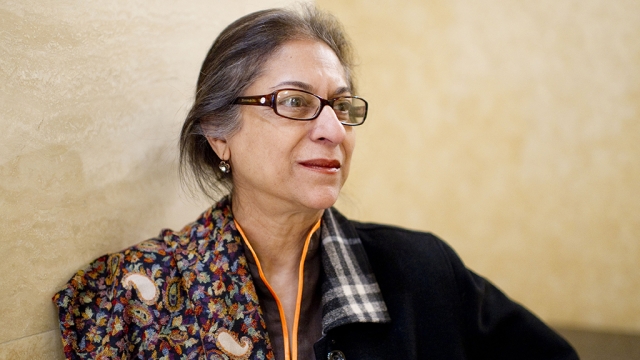 Photo by Carlos Osorio/Toronto Star via Getty Images
Photo by Carlos Osorio/Toronto Star via Getty ImagesFile photo of Asma Jahangir
NATIONAL HERALD INDIA
Webseite des National Herald, Delhi
“We will miss you, Asma Jahangir”
Published: Feb 12th 2018, 03.10 PM
When the common people especially women, minorities, marginalised communities
and working class in our sub-continent are being subjected to unparalleled violence
inflicted by the state, religious bigots, feudal elites and crony capitalists,
one of the greatest fighters for the rights of the common people—Asma Jahangir—
is no more. The well-known Pakistani human rights activist and senior lawyer,
a dear friend, passed away in Lahore on Sunday, February 11. Asma died
of cardiac arrest when she was only 66.
and working class in our sub-continent are being subjected to unparalleled violence
inflicted by the state, religious bigots, feudal elites and crony capitalists,
one of the greatest fighters for the rights of the common people—Asma Jahangir—
is no more. The well-known Pakistani human rights activist and senior lawyer,
a dear friend, passed away in Lahore on Sunday, February 11. Asma died
of cardiac arrest when she was only 66.
Asma was born in 1952 in a political family which boasted a long tradition
of opposing military rulers and religion-based politics in Pakistan.
Her father was a great supporter of the political rights of the people of East Pakistan.
She and her sister Hina Jilani became the most prominent faces of resistance
to Islamist politics in Pakistan. They faced immense difficulties due
to their views during Zia-ul-Haq's regime, but they never compromised.
Asma Jahangir till her last breath kept on fighting indefatigably
for the rights of minorities and women in Pakistan.
of opposing military rulers and religion-based politics in Pakistan.
Her father was a great supporter of the political rights of the people of East Pakistan.
She and her sister Hina Jilani became the most prominent faces of resistance
to Islamist politics in Pakistan. They faced immense difficulties due
to their views during Zia-ul-Haq's regime, but they never compromised.
Asma Jahangir till her last breath kept on fighting indefatigably
for the rights of minorities and women in Pakistan.
Asma co-founded the Human Rights Commission of Pakistan in 1987
and became its Secretary General until 1993, when she was elevated
as the commission’s chairperson.
Later, she also became president of Pakistan’s Supreme Court Bar Association.
She also co-chaired South Asians for Human Rights.
Due to her unwavering commitment against state and religious persecution
of minorities in Pakistan, she was appointed United Nations Special Rapporteur
on Extrajudicial, Arbitrary or summary executions,
and later as the United Nations Rapporteur on Freedom of religion or belief.
and became its Secretary General until 1993, when she was elevated
as the commission’s chairperson.
Later, she also became president of Pakistan’s Supreme Court Bar Association.
She also co-chaired South Asians for Human Rights.
Due to her unwavering commitment against state and religious persecution
of minorities in Pakistan, she was appointed United Nations Special Rapporteur
on Extrajudicial, Arbitrary or summary executions,
and later as the United Nations Rapporteur on Freedom of religion or belief.
Asma and Hina founded an institution which worked 24x7 to help victims of rape,
Hudood Law, religious violence and police repression.
She took the issue of 'disappearances' of political activists in Baluchistan
by the Pakistan army to UN. She was imprisoned many times
and was on top of the hit list of Islamofascists in Pakistan,
including in the army intelligence agencies.
Hudood Law, religious violence and police repression.
She took the issue of 'disappearances' of political activists in Baluchistan
by the Pakistan army to UN. She was imprisoned many times
and was on top of the hit list of Islamofascists in Pakistan,
including in the army intelligence agencies.
Asma Jahangir till her last breath
kept on fighting indefatigably for the rights of minorities
and women in Pakistan
She was not only a severe critique of Islamist bigots and state terrorism in Pakistan
but she was equally hard hitting against India for human rights excesses,
especially in Kashmir. She was never welcome in India, denied a visa many times.
Even when she was allowed to visit India in 2009, her room was raided
by the Delhi Police on suspicion of indulging in anti-national activities.
Asma in her typical feisty reaction told the media that it did not trouble her much
as she "had gotten used to [this kind of treatment] in Pakistan".
but she was equally hard hitting against India for human rights excesses,
especially in Kashmir. She was never welcome in India, denied a visa many times.
Even when she was allowed to visit India in 2009, her room was raided
by the Delhi Police on suspicion of indulging in anti-national activities.
Asma in her typical feisty reaction told the media that it did not trouble her much
as she "had gotten used to [this kind of treatment] in Pakistan".
I interviewed her in August 1995,after an attempt was made on her life
within the compound of the Lahore High Court in February, 1995.
The views she expressed 23 years back are relevant even today.
“Act now against fundamentalism”, she had warned in that interview.
within the compound of the Lahore High Court in February, 1995.
The views she expressed 23 years back are relevant even today.
“Act now against fundamentalism”, she had warned in that interview.
If only her warnings had been heeded, both Pakistan and India
would not have been at the mercy of criminals, who under the garb of religion
are dismantling whatever was civilized and humane in the region.
would not have been at the mercy of criminals, who under the garb of religion
are dismantling whatever was civilized and humane in the region.
Keine Kommentare:
Kommentar veröffentlichen